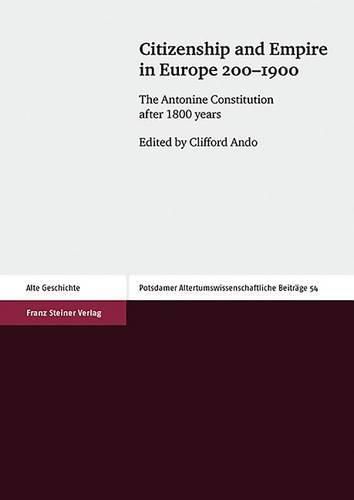Readings Newsletter
Become a Readings Member to make your shopping experience even easier.
Sign in or sign up for free!
You’re not far away from qualifying for FREE standard shipping within Australia
You’ve qualified for FREE standard shipping within Australia
The cart is loading…






In 212 CE, the emperor Caracalla extended citizenship to nearly all free-born residents of the Roman Empire. In doing so, he transformed not only his own, but the very ideal of empire and statehood in Europe. This volume first inquires into the contexts of Caracalla’s act in his own day. Rome was an ancient empire: it had traditionally ruled over populations that were conceived and governed as distinct units, a practice that was both strategic and ideological. What were the practical and political effects of a universalizing ideology in this context? Was there a reorientation of private social and legal practice in response? And what politics of exclusion came to apply, now that citizenship no longer served to distinguish persons of higher and lower status? The volume subsequently traces the history of citizenship in universalizing ideologies and legal practice from late antiquity to the codification of law in Europe in the nineteenth century. Caracalla’s act was then repeatedly cited as the ideal toward which sovereign polities should strive, be they states or empires. Citizenship and law were thereby made preeminent among the universalisms of European statecraft.
$9.00 standard shipping within Australia
FREE standard shipping within Australia for orders over $100.00
Express & International shipping calculated at checkout
In 212 CE, the emperor Caracalla extended citizenship to nearly all free-born residents of the Roman Empire. In doing so, he transformed not only his own, but the very ideal of empire and statehood in Europe. This volume first inquires into the contexts of Caracalla’s act in his own day. Rome was an ancient empire: it had traditionally ruled over populations that were conceived and governed as distinct units, a practice that was both strategic and ideological. What were the practical and political effects of a universalizing ideology in this context? Was there a reorientation of private social and legal practice in response? And what politics of exclusion came to apply, now that citizenship no longer served to distinguish persons of higher and lower status? The volume subsequently traces the history of citizenship in universalizing ideologies and legal practice from late antiquity to the codification of law in Europe in the nineteenth century. Caracalla’s act was then repeatedly cited as the ideal toward which sovereign polities should strive, be they states or empires. Citizenship and law were thereby made preeminent among the universalisms of European statecraft.